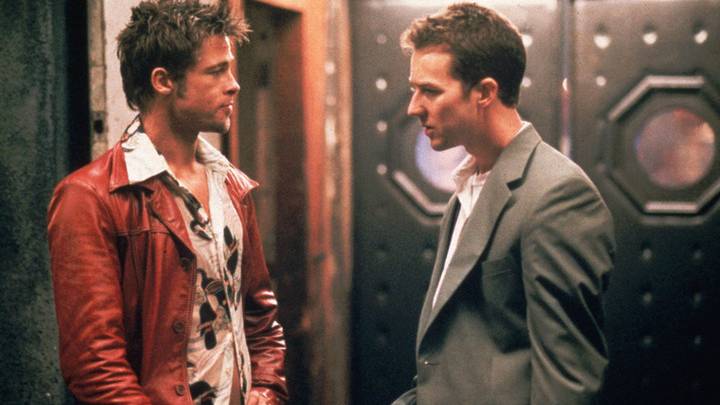
"The first rule of Fight Club is: you do not talk about Fight Club."
It might come as a shock, but David Fincher’s ferocious satire is now 25 years old — and it still packs a fierce punch. More to the point, a quarter of a century on, we’re still talking about Fight Club.
Based on the novel by American author Chuck Palahniuk, Fincher’s film was surprisingly a box-office flop on its initial release on the eve of the new millennium, only to find a devoted following on home video and end up an established cult classic, its infamous rules firmly embedded in pop culture. However, for those encountering the film for the first time, here's a brief introduction to its leading trio of characters.

Played by Edward Norton, the film's narrator (let's call him Jack) is a white-collar, insomniac drudge who haunts self-help groups for the incurably ill; Helen Bonham Carter, playing spectacularly against type, is fellow help-group tourist Marla Singer, a cynical nihilist with wonky eye-liner who gets under Jack's skin; and Brad Pitt is Tyler Durden, a charismatic rebel who turns stolen liposuction fat into expensive designer soap and who offers Jack a release from his alienated life by introducing him to the bruising joys of bare-knuckle fighting. The underground club the pair create for similarly disaffected men evolves into the subversive Project Mayhem, an anarchist movement committed to ever-escalating acts of terrorism against symbols of modern materialism.

In Fincher’s hands, all this adds up to a savagely funny film that shocks, provokes and sucker-punches the viewer. You either love it or hate it. Yet in the often strident and rowdy conversation Fight Club has generated since 1999, many of its most ardent fans appear to have misunderstood what the film is getting at.
Of course, Fight Club’s swingeing attack on consumerism lands blows that no one could miss. The narrator’s efforts to fill the void in his life with lifestyle goods, thumbing through the Ikea catalogue as if it were a porn magazine, don’t deliver happiness. And, as his new friend Tyler observes, he’s not the only one feeling miserable.
"We're consumers. We are by-products of a lifestyle obsession. Murder, crime, poverty, these things don't concern me. What concerns me are celebrity magazines, television with 500 channels, some guy's name on my underwear."
For Pitt's Tyler, however, the narrator's malaise goes far deeper than an obsession with corporate brands. Its real root is the emasculation of men in modern, post-industrial societies.
"We’re designed to be hunters and we’re in a society of shopping. There’s nothing to kill anymore, there’s nothing to fight, nothing to overcome, nothing to explore.”
Hence Tyler and the narrator’s creation of fight club as an outlet for its male followers’ anger and frustration, and hence the anarchic pranks Tyler plays while moonlighting as a cinema projectionist (splicing frames of pornography into family films) and as a banquet waiter in luxury hotels (urinating in the soup). Yet none of this is enough for Tyler, and by his instigation, the fight clubs that have sprung up around the country develop into cells of urban terrorists aiming to bring down the edifice of capitalism itself: Project Mayhem.
On-screen, all of this is as exciting as it is disturbing. But don’t let the energy and bravura of Fincher’s direction fool you into thinking his film endorses either the violence of its bare-knuckle brawls or its more public acts of violent nihilism, although quite a few viewers have applauded both, with a number of online men’s rights communities particularly in thrall to the former in the quarter century since the film’s first release.
Then again, with the benefit of hindsight, it’s easy to see how Brad Pitt’s blazing charisma and weapons-grade cool as Tyler has blinded many to what is really going on in Fight Club. As the plot’s big reveal makes clear, the film emphatically rejects Tyler's solutions to society’s ills just as emphatically as it rejects mindless consumerism, and it is not the violent outlet of the fight clubs but the promise of human connection that Norton’s narrator finds with Bonham Carter’s Marla that offers him a real possibility of emotional and psychological healing.
Park Circus is releasing Fight Club in over 100 UK cinemas from March 15.







